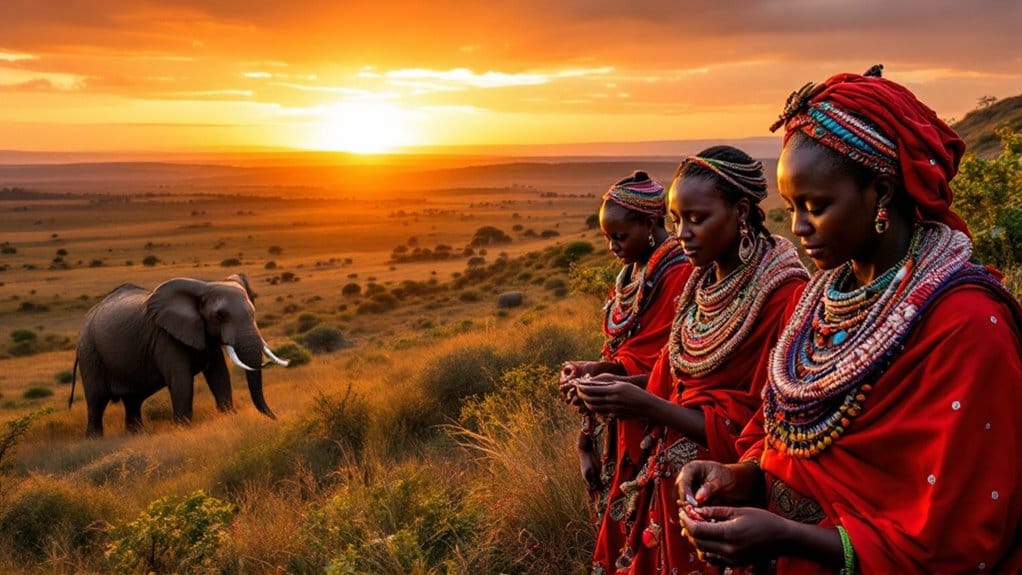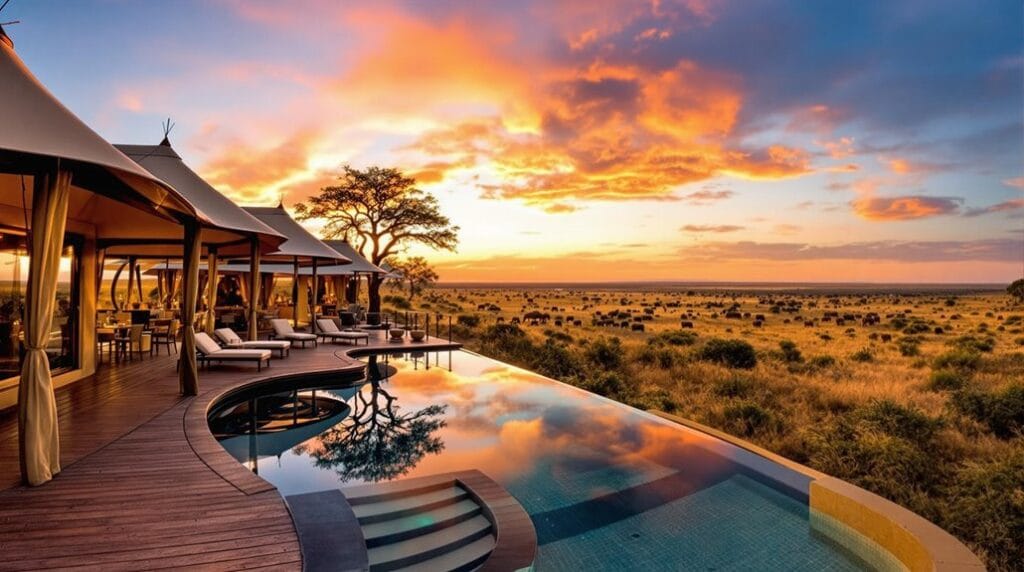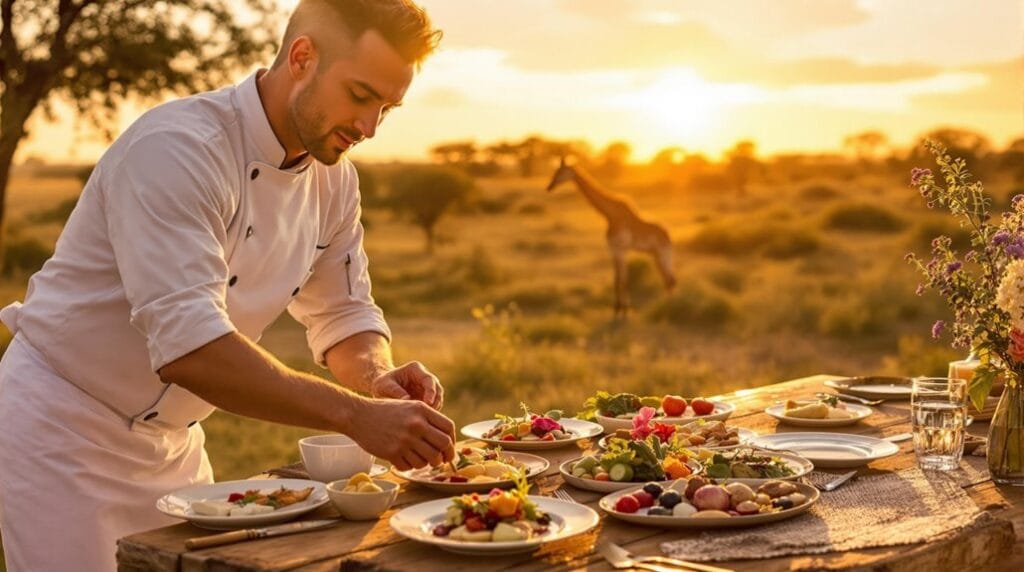When you consider the cultural significance of African wildlife preservation, you might find it intriguing how deeply intertwined these majestic creatures are with the identities and traditions of local communities. It's not just about conservation; it's about sustaining ancestral ties and enriching spiritual beliefs that shape cultural narratives. As you explore the various reasons behind this importance, you may uncover unexpected connections that highlight the role of biodiversity in maintaining cultural heritage. What might surprise you is how these factors collectively influence contemporary society and its future.
Key Takeaways
- African wildlife is integral to cultural heritage, shaping identities and community connections through rituals and ceremonies that respect biodiversity.
- The Maasai people's relationship with wildlife and cattle highlights the social and cultural significance of animals in traditional stories and practices.
- Loss of wildlife threatens biodiversity, eroding cultural storytelling and disrupting ancestral threads, which are vital for community identity.
- Wildlife inspires local art, folklore, and music, enhancing cultural expression and reinforcing the need for conservation to sustain these traditions.
- Indigenous knowledge systems underscore the importance of local biodiversity for food security and spiritual beliefs, essential for preserving cultural practices.
Connection to Ancestral Traditions
When you immerse yourself in the rich tapestry of African cultures, you'll quickly see how intertwined wildlife is with ancestral traditions. Animals aren't just part of the landscape; they embody the cultural heritage that shapes identities and connects communities to their past.
Many rituals and ceremonies revolve around wildlife, underscoring their role in maintaining a deep respect for biodiversity and the natural world.
For instance, the Maasai people illustrate this connection vividly. Their bond with cattle and wildlife isn't merely practical; it's a core part of their social structures and cultural practices. Traditional stories and oral histories often feature animals, imparting moral lessons and cultural values that resonate through generations.
As you explore these connections, you'll realize that wildlife preservation isn't just about saving species; it's about safeguarding the cultural expressions that define communities. The loss of an animal can mean losing a piece of identity, a disruption of the ancestral threads that weave people together.
Spiritual Significance in Communities
In many African communities, wildlife isn't just part of the landscape; it's an essential thread in the fabric of cultural identity and spiritual practices.
You'll find that animals often symbolize ancestral spirits, serving as powerful reminders of heritage and connection to the divine.
Cultural Identity and Heritage
Recognizing the spiritual significance of African wildlife can deepen your understanding of the rich cultural tapestry woven into many communities. For countless ethnic groups, like the Maasai, wildlife isn't just part of the landscape; it embodies their cultural identity. Traditional customs are often centered around animals that symbolize ancestral spirits, reinforcing community bonds through shared narratives and rituals.
Animals, such as elephants and lions, hold sacred status, fostering respect for nature and reminding you of the interconnectedness of all life. When you participate in or learn about these traditions, you witness the essential role that wildlife plays in sustaining cultural heritage.
However, the decline of wildlife populations poses a significant threat, not just to biodiversity but to the very essence of these communities. Wildlife conservation becomes important, as it safeguards the traditional practices and stories that shape identities and values.
Spiritual Practices and Beliefs
While many may see wildlife as mere animals in the landscape, for countless African communities, these creatures embody profound spiritual significance that shapes their very existence. Your connection to wildlife goes beyond the physical; it intertwines with spiritual practices and cultural traditions that have endured for generations.
Animals like elephants and lions aren't just part of the environment; they're revered as ancestral spirits, pivotal in rituals that honor the divine and link you to your heritage.
These spiritual practices often involve animal sacrifices, serving not only as sustenance but also reinforcing communal bonds and cultural identity. Through such rituals, you honor deities and ancestors, weaving a rich tapestry of beliefs that enrich your community's moral fabric.
Wildlife is steeped in oral traditions and folklore, symbolizing wisdom and the interconnectedness of life.
Moreover, your commitment to conservation stems from a profound understanding that losing these animals disrupts spiritual balance and harmony within your community and the natural world.
Promotion of Ecotourism
Ecotourism isn't just about witnessing Africa's breathtaking wildlife; it's a powerful driver of economic growth and community empowerment.
By supporting local initiatives, you'll see how tourism revenue uplifts communities and promotes sustainable practices that protect precious ecosystems.
This connection between conservation and awareness creates a ripple effect, inspiring a global commitment to wildlife preservation that benefits us all.
Economic Benefits of Ecotourism
When you think about the breathtaking landscapes and incredible wildlife of Africa, it's hard not to appreciate the economic benefits that ecotourism brings to local communities. This vibrant sector generates an astounding $200 billion annually, providing essential support for sustainable development and conservation efforts.
By visiting protected areas and national parks, like the Serengeti and Kruger National Park, you contribute to the economic value of wildlife preservation, which attracts millions of tourists each year.
Ecotourism creates thousands of jobs in guiding, hospitality, and conservation-related activities. These employment opportunities not only alleviate poverty but also enhance the livelihoods of local communities, fostering a sense of belonging and shared responsibility.
Plus, as you engage in ecotourism, you help promote awareness and appreciation for Africa's rich biodiversity, encouraging a collective stewardship that's indispensable for ongoing conservation efforts.
What's more, up to 80% of the profits from wildlife tourism are reinvested into local communities and conservation projects.
Community Empowerment Initiatives
In the heart of Africa, community empowerment initiatives are transforming the landscape of wildlife conservation through the promotion of ecotourism. By engaging in wildlife tourism, local communities take ownership of their natural heritage, turning conservation efforts into viable economic opportunities.
Imagine being part of a movement where communities earn up to three times more from wildlife-related activities than traditional land uses. This not only enhances economic stability but also incentivizes locals to protect their environment.
These initiatives provide essential education and training, equipping individuals with skills in hospitality, guiding, and conservation practices. As community members grow in expertise, they become empowered stewards of their wildlife, ensuring sustainable practices for future generations.
Additionally, ecotourism fosters cultural exchange, allowing visitors to immerse themselves in local traditions and lifestyles. This connection deepens the cultural significance of wildlife preservation, uniting people from different backgrounds in a shared mission.
When you support these community empowerment initiatives, you're not just promoting wildlife tourism; you're helping local communities thrive while safeguarding Africa's rich biodiversity.
Together, we can celebrate and protect the vibrant cultures intertwined with the continent's precious wildlife.
Conservation Awareness and Education
Through immersive experiences in nature, you can truly grasp the essential role of conservation awareness and education in wildlife preservation. By participating in ecotourism, you help foster a culture that values protecting wildlife, while also reaping the cultural and economic significance it brings to local communities.
Here's how ecotourism makes a difference:
- Economic Empowerment: In 2019, ecotourism contributed over $34 billion to Africa's GDP, providing livelihoods that reduce reliance on poaching.
- Cultural Preservation: Engaging with local traditions during your travels reinforces their identity, ensuring cultural practices thrive alongside wildlife.
- Biodiversity Appreciation: Immersive wildlife experiences enhance your understanding of ecological issues, fostering a 20% increase in local support for wildlife conservation.
As you explore Africa's breathtaking landscapes, remember that your participation in ecotourism cultivates education and awareness, empowering communities to embrace sustainable practices.
Together, we can make a lasting impact on the conservation of African wildlife, ensuring future generations inherit a vibrant, thriving ecosystem.
Join the movement, and be a part of something greater!
Biodiversity and Cultural Identity
Biodiversity is more than just a collection of species; it's the heartbeat of cultural identity across Africa. When you explore the vibrant tapestry of this continent, you'll find over 1,100 mammal species and 1,200 bird species, each playing a pivotal role in the lives of various ethnic groups.
Think of the Maasai and their profound connection to lions, symbols of bravery and strength woven into their very essence.
Indigenous knowledge systems, passed down through generations, highlight how essential local biodiversity is for sustaining traditional practices, food security, and even spiritual beliefs.
You can see how the loss of biodiversity doesn't just threaten ecosystems; it jeopardizes the cultural heritage and the livelihoods that communities depend on.
Influence on Art and Literature
African wildlife isn't just a backdrop; it's a vibrant force that shapes the continent's art and literature. As you explore African culture, you'll discover how the majestic animals of the savanna and the rich landscapes inspire creativity.
Consider these artistic expressions:
- Sculptures and beadwork reflect the spiritual connection to wildlife, showcasing cultural beliefs and practices.
- Literary works weave tales of resilience, where animals symbolize the deep ties between communities and their environment.
- Traditional storytelling often features animals as central characters, imparting moral lessons and preserving indigenous knowledge.
This fusion of wildlife and cultural heritage fosters a profound respect for nature and emphasizes wildlife conservation.
Authors increasingly spotlight these issues, using their narratives to advocate for environmental awareness and the urgent need to protect natural habitats.
By embracing these artistic and literary themes, you not only connect with a rich cultural legacy but also join a collective effort to preserve Africa's incredible wildlife for future generations.
Engaging with this art and literature not only cultivates a deeper understanding of African culture but also strengthens your bond with the land and its inhabitants.
Educational Opportunities for Local Populations
Often, communities that engage in wildlife preservation discover transformative educational opportunities that not only enrich their understanding of the environment but also empower them economically. By participating in educational programs focused on wildlife preservation, local communities deepen their appreciation for biodiversity, fostering a sense of stewardship towards their natural surroundings.
| Educational Initiatives | Impact on Local Communities |
|---|---|
| Workshops on wildlife management | Skills for eco-tourism and sustainable practices |
| School curricula incorporating wildlife education | Awareness of ecological and cultural significance |
| Involvement in research and monitoring programs | Empowerment and investment in natural heritage |
These initiatives enhance economic independence while preserving cultural significance. Schools and community centers can uplift future generations by integrating wildlife education into their teachings, shaping a collective consciousness that values conservation. Collaborating with local artisans to create culturally relevant materials not only fortifies community ties but emphasizes the importance of preserving both wildlife and traditional knowledge. When you engage in these conservation efforts, you're not just protecting the environment; you're also nurturing a sense of belonging and identity among local populations. Together, you can build a future where wildlife and culture thrive hand in hand.
Community Engagement in Conservation
When you empower local communities to take the lead in conservation, you're not just protecting wildlife; you're fostering a deeper connection between people and nature.
Community-led projects and education programs can transform how locals view biodiversity, turning awareness into action.
Local Empowerment Initiatives
Engaging local communities in wildlife conservation isn't just a strategy; it's a transformative approach that empowers individuals and enriches cultural heritage. When you involve local populations, you create a sense of belonging and ownership that's essential for the success of conservation efforts.
Here are three impactful ways local empowerment initiatives achieve this:
- Decision-Making Involvement: By integrating traditional knowledge into preservation strategies, communities shape their futures and guarantee sustainable practices.
- Economic Incentives: Programs like community-run lodges and safaris generate significant revenue, transforming conservation into a viable livelihood for residents.
- Education and Awareness: Tailored campaigns foster a connection between locals and wildlife, igniting passion and reducing poaching.
These initiatives not only bolster wildlife conservation but also strengthen cultural identity and community resilience.
Collaborative efforts between NGOs and local groups can lead to innovative solutions, merging sustainable agriculture with habitat protection.
When you support local empowerment initiatives, you're participating in a movement that values both nature and the rich cultures that coexist with it. Together, you can create a brighter future for wildlife and the vibrant communities that cherish them.
Community-Led Conservation Projects
Community-led conservation projects are a beacon of hope, bridging the gap between local cultures and wildlife preservation. By empowering local populations, these initiatives involve communities directly in decision-making processes, ensuring that conservation efforts respect their cultural values and livelihoods.
When you engage in community-led conservation, you're not just supporting wildlife; you're fostering a deep sense of ownership and responsibility among the people who live closest to these precious ecosystems.
These projects often promote sustainable practices like eco-tourism, providing tangible economic benefits that reinforce a community's commitment to wildlife preservation. You'll find that integrating traditional ecological knowledge into these efforts enhances biodiversity conservation and builds resilience against environmental changes.
Moreover, collaboration between communities and conservation organizations leads to innovative solutions for human-wildlife conflicts, creating a win-win scenario for both wildlife and local populations.
When you participate in or support these projects, you're not just advocating for animals; you're helping to weave together the rich tapestry of cultural heritage and environmental stewardship. Together, we can create a future where wildlife thrives alongside vibrant communities, celebrating both nature and the people who cherish it.
Education and Awareness Programs
Education and awareness programs serve as crucial pillars in the quest for wildlife conservation, igniting a sense of responsibility among local communities. When you engage with these programs, you're not just learning; you're becoming a significant part of a movement that respects and protects our natural heritage.
Consider the impact of these initiatives:
- Hands-on Workshops: You gain practical skills while connecting with your environment and learning sustainable practices that benefit both wildlife and your community.
- Youth Engagement: By involving schools, you inspire the next generation, creating passionate advocates for wildlife preservation who understand its importance.
- Traditional Ecological Knowledge: Blending this age-old wisdom with modern conservation strategies strengthens community ties and enhances wildlife management efforts.
Through community-led conservation projects, you can see real success stories that balance local needs with ecological preservation.
It's about belonging to something bigger than yourself, about safeguarding the wildlife that enriches our lives. Together, let's foster a culture of stewardship that guarantees our shared environment thrives for generations to come.
Your involvement makes all the difference!
Preservation of Indigenous Knowledge
Preserving indigenous knowledge is essential for the future of wildlife conservation in Africa, as it bridges the gap between age-old traditions and modern scientific practices. This rich tapestry of cultural wisdom encompasses traditional practices, ecological understanding, and beliefs that have been passed down through generations.
By valuing indigenous knowledge, you gain unique insights into animal behavior, plant uses, and ecosystem management, which are crucial for effective wildlife management and ensuring biodiversity.
When you recognize the importance of indigenous practices, like seasonal migrations and land-use patterns, you tap into a deep understanding of ecological balance that fosters healthy wildlife populations and their habitats. Integrating these traditional ecological insights with scientific approaches enhances conservation strategies tailored to local environments.
Moreover, empowering local communities through the recognition of their knowledge not only safeguards their cultural heritage but also promotes stewardship of natural resources. This collective effort builds resilience against environmental changes, making it imperative for anyone passionate about wildlife to support the preservation of indigenous knowledge.
Together, we can cultivate a future where both cultural heritage and wildlife thrive harmoniously.
Economic Benefits From Wildlife
Harnessing the economic potential of wildlife is essential for Africa's growth and sustainability. The benefits of wildlife populations extend far beyond conservation; they play a crucial role in local economies. By embracing eco-tourism and sustainable development, you can witness transformative changes in your community.
Here are three powerful economic benefits:
- Revenue Generation: Wildlife-based tourism pumps over $12 billion annually into economies, especially in countries like Kenya and Tanzania. This supports thousands of jobs and livelihoods.
- Higher Income from Eco-Tourism: Eco-tourism can yield 3-5 times the income compared to traditional agriculture, giving communities a more sustainable financial future.
- Alternative Resources: Sustainable harvesting of wildlife resources not only boosts food security but reduces reliance on unsustainable practices.
National parks and wildlife reserves draw millions of tourists each year, directly funding community development and infrastructure improvements.
Role in Global Cultural Heritage
African wildlife isn't just a collection of species; it's a vibrant tapestry woven into the continent's cultural heritage. Each majestic elephant and roaring lion embodies the spiritual beliefs and traditional rituals of countless communities. These animals inspire art, folklore, and music that resonate not only locally but globally, creating a unique cultural identity that binds us all.
When you embrace the preservation of African wildlife, you're also supporting the rich biodiversity that's essential to these cultural expressions. Traditional ecological practices reflect indigenous knowledge systems deeply rooted in respect for nature, ensuring that future generations inherit these invaluable lessons.
Moreover, eco-tourism plays a crucial role in this narrative. By visiting and appreciating Africa's wildlife, you're contributing to conservation efforts that fund both cultural preservation initiatives and local economies. You help raise awareness and foster a sense of global community around African heritage.
However, the loss of wildlife not only threatens biodiversity but also erodes the cultural expressions tied to animal symbolism and storytelling. By safeguarding these species, you're helping to maintain the essence of a heritage that connects us all, ensuring it thrives for generations to come.
Frequently Asked Questions
Why Are Animals Important in African Culture?
Animals hold immense significance in African culture, reflecting deep spiritual connections and traditional beliefs.
You'll find that wildlife symbolism enriches storytelling practices, where animals embody virtues like bravery and resilience.
These connections not only shape community identities but also preserve cultural heritage.
By honoring animals, you celebrate your ancestors and maintain the essence of your traditions.
Embracing this relationship fosters unity and belonging among communities, ensuring that these essential narratives live on.
Why Is African Wildlife Important?
African wildlife's wondrous worth weaves together essential biodiversity benefits and ecological balance.
As you explore, you'll discover how traditional practices celebrate these majestic creatures, fostering community engagement.
The tourism impact is profound, pouring money into local economies and enhancing cultural ties.
When you appreciate and protect wildlife, you're not just preserving nature; you're embracing the essence of identity and heritage that binds people to their land and each other.
Why Is Conservation Important in Africa?
Conservation in Africa's essential for you and the planet.
By engaging in sustainable practices, you support biodiversity preservation, ensuring unique ecosystems thrive.
The ecotourism benefits boost local economies, creating jobs while fostering community engagement.
Habitat restoration helps wildlife flourish, enabling you to experience the beauty of nature firsthand.
When you protect Africa's wildlife, you're not just preserving species; you're nurturing a rich cultural heritage that connects us all to the natural world.
How Has African Culture Influenced the World?
African culture influences the world through its vibrant art, enchanting traditional storytelling, profound spiritual beliefs, rich indigenous practices, and powerful cultural symbolism.
You feel the rhythmic beats of African art echoing in music worldwide, while the depth of its storytelling enriches literature.
You see its spiritual wisdom reflected in diverse practices and its symbols inspire global conversations.
Embracing these elements connects you to a rich heritage that shapes our shared human experience.
Conclusion
In summary, preserving African wildlife isn't just about saving animals; it's about safeguarding rich cultural heritages and vibrant communities. You might think conservation is too costly, but investing in wildlife actually empowers local economies and fosters cultural pride. By championing these majestic creatures, you help maintain ancestral traditions and spiritual connections that define many communities. Together, we can guarantee that future generations inherit a world where culture and nature thrive hand in hand. Let's take action now!








